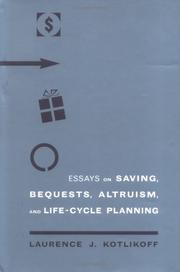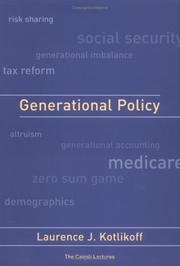| Listing 1 - 10 of 284 | << page >> |
Sort by
|
Book
ISBN: 0262111373 9780262111379 Year: 1989 Publisher: Cambridge, Mass. MIT
Abstract | Keywords | Export | Availability | Bookmark
 Loading...
Loading...Choose an application
- Reference Manager
- EndNote
- RefWorks (Direct export to RefWorks)
Money market. Capital market --- Savings --- Saving and investment --- AA / International- internationaal --- US / United States of America - USA - Verenigde Staten - Etats Unis --- 339.311.6 --- 339.311.3 --- 368.40 --- 339.311.1 --- 339.311.0 --- 339.311.2 --- Beleid met betrekking tot het sparen (zie pensioensparen 332.834). --- Evolutie van het sparen. --- Sociale voorzorg en verzekeringen. Sociale zekerheid: algemeenheden. --- Spaarneiging. --- Sparen: algemeenheden. --- Structuur van het sparen. --- Saving and investment. --- Accumulation, Capital --- Capital accumulation --- Capital formation --- Investment and saving --- Saving and thrift --- Capital --- Supply-side economics --- Wealth --- Investments --- Sparen: algemeenheden --- Spaarneiging --- Structuur van het sparen --- Evolutie van het sparen --- Beleid met betrekking tot het sparen (zie pensioensparen 332.834) --- Sociale voorzorg en verzekeringen. Sociale zekerheid: algemeenheden

ISBN: 0262112620 9780262112628 Year: 2001 Publisher: Cambridge (Mass.): MIT press
Abstract | Keywords | Export | Availability | Bookmark
 Loading...
Loading...Choose an application
- Reference Manager
- EndNote
- RefWorks (Direct export to RefWorks)
Saving and investment --- Retirement --- Income distribution --- Altruism --- Planning --- Planning. --- 330.56 <73> --- 659.03 <73> --- 659.03 <73> Publicity. Information work. Public relations--?.03--Verenigde Staten van Amerika. VSA. USA --- Publicity. Information work. Public relations--?.03--Verenigde Staten van Amerika. VSA. USA --- 330.56 <73> Nationaal inkomen. Volksinkomen. Gezinsinkomen. Vermogensstratificatie. Particuliere inkomens en bestedingen. Armoede. Honger--Verenigde Staten van Amerika. VSA. USA --- Nationaal inkomen. Volksinkomen. Gezinsinkomen. Vermogensstratificatie. Particuliere inkomens en bestedingen. Armoede. Honger--Verenigde Staten van Amerika. VSA. USA --- Altruistic behavior --- Unselfishness --- Conduct of life --- Helping behavior --- Saving and investment - United States --- Retirement - United States - Planning --- Income distribution - United States --- Altruism - United States

ISBN: 0029175852 9780029175859 Year: 1993 Publisher: New York The Free Press
Abstract | Keywords | Export | Availability | Bookmark
 Loading...
Loading...Choose an application
- Reference Manager
- EndNote
- RefWorks (Direct export to RefWorks)
Fiscal policy --- -Generational accounting --- -Budget deficits --- -339.50973 --- Deficits, Budget --- Budget --- Deficit financing --- Generational accounts --- Finance, Public --- Tax policy --- Taxation --- Economic policy --- Accounting --- Government policy --- United States --- Economic conditions --- U.S.A. --- Jungtinės Amerikos valstybės --- Soedinennye Shtaty Si︠e︡vernoĭ Ameriki --- Soedinennye Shtaty Severnoĭ Ameriki --- Si︠e︡vero-Amerikanskīe Soedinennye Shtaty --- Severo-Amerikanskie Soedinennye Shtaty --- Zlucheni Derz︠h︡avy --- USA --- US --- Arhab --- Ar. ha-B. --- Artsot ha-Berit --- ولايات المتحدة الامريكية --- Wilāyāt al-Muttaḥidah al-Amirīkīyah --- ABSh --- Amerika Birlăshmish Shtatlary --- ABŞ --- Amerika Birlăşmi Ştatları --- Forente stater --- Spojené staty americké --- Severo-Amerikanskie Shtaty --- Sjedinjene Američke Države --- Zʹi︠e︡dnani Derz︠h︡avy Ameryky --- Amerikai Egyesült Államok --- Yhdysvallat --- Verenigde Staten --- Egyesült Államok --- Hiwsisayin Amerikayi Miatsʻeal Tērutʻiwnkʻ --- Estados Unidos de América --- United States of America --- Fareyniḳṭe Shṭaṭn --- Artzois Ha'bris --- Estados Unidos da América do Norte --- SShA --- Soedinennye Shtaty Ameriki --- VSA --- États-Unis d'Amérique --- Vereinigte Staaten von Amerika --- Stati Uniti d'America --- Estados Unidos --- EE.UU. --- Stany Zjednoczone --- ĒPA --- Amerika Qūrama Shtattary --- Amerika Qŭshma Shtatlari --- SAD --- Saharat ʻAmērikā --- Hēnomenai Politeiai Amerikēs --- ZSA --- Mei-kuo --- Meiguo --- Mei guo --- ZDA --- Združene države Amerike --- U.S. --- America (Republic) --- Amirika Carékat --- Verenigde State van Amerika --- VS --- ولايات المتحدة --- Wilāyāt al-Muttaḥidah --- ولايات المتّحدة الأمريكيّة --- Wilāyāt al-Muttaḥidah al-Amrīkīyah --- Estatos Unitos --- Estatos Unitos d'America --- Ètats-Unis d'Amèrica --- Estaos Xuníos d'América --- Estaos Xuníos --- Tetã peteĩ reko Amérikagua --- Istadus Unidus --- Amerika Birlăşmiş Ştatları --- Amerika ka Kelenyalen Jamanaw --- Bí-kok --- Amerika Qushma Shtattary --- AQSh --- Злучаныя Штаты Амерыкі --- Zluchanyi︠a︡ Shtaty Ameryki --- Yunaeted Stet blong Amerika --- Yunaeted Stet --- Vaeinigte Staatn --- Vaeinigte Staatn vo Amerika --- Stadoù-Unanet Amerika --- Sŭedineni amerikanski shtati --- САЩ --- SASht --- Съединените щати --- Sŭedinenite shtati --- Америка (Republic) --- Amerika (Republic) --- Estats Units d'Amèrica --- Америкӑри Пӗрлешӳллӗ Штатсем --- Amerikări Pĕrleshu̇llĕ Shtatsem --- Stati Uniti --- SUA (Stati Uniti d'America) --- Unol Daleithiau America --- Unol Daleithiau --- Amerikas Forenede Stater --- Vereinigte Staaten --- Wááshindoon Bikéyah Ałhidadiidzooígíí --- Zjadnośone staty Ameriki --- Ameerika Ühendriigid --- Ηνωμένες Πολιτείες της Αμερικής --- Hēnōmenes Politeies tēs Amerikēs --- Η.Π.Α. --- Ē.P.A. --- Usono --- Unuiĝintaj Ŝtatoj de Ameriko --- Американь Вейтьсэндявкс Штаттнэ --- Amerikanʹ Veĭtʹsėndi︠a︡vks Shtattnė --- Ameriketako Estatu Batuak --- Feriene Steaten --- Feriene Steaten fan Amearika --- FS --- Stâts Unîts di Americhe --- Stâts Unîts --- Stáit Aontaithe Mheiriceá --- Steatyn Unnaneysit America --- Steatyn Unnaneysit --- S.U.A. --- Na Stàitean Aonaichte --- NSA --- Mî-koet --- 미국 --- Miguk --- Amerikayi Miatsʻyal Nahangner --- Miatsʻyal Nahangner --- -Fiscal policy --- Generational accounting --- Budget deficits --- depenses publiques --- eua --- politique fiscale --- solde budgetaire --- 311.94 --- 336.204 --- 336.300 --- 336.61 --- 339.311.1 --- 368.43 --- US / United States of America - USA - Verenigde Staten - Etats Unis --- overheidsuitgaven --- vsa --- fiscaal beleid --- begrotingssaldo --- Verdeling van de bevolking naar leeftijd. Veroudering van de bevolking --- weerslag, invloed, last en verdeling van de belasting --- Overheidskrediet en rijksschuld: naslagwerken en principes --- Financieel beleid --- Spaarneiging --- Ouderdomsverzekering. Voorbarige dood. Weduwen en wezen --- Fiscal policy - United States --- Generational accounting - United States --- Budget deficits - United States --- United States - Economic conditions - 1981-2001

ISBN: 0262277530 1423725220 0262263378 9780262277532 9780262263375 9781423725220 0262112833 9780262112833 Year: 2003 Publisher: Cambridge (Mass.): MIT press
Abstract | Keywords | Export | Availability | Bookmark
 Loading...
Loading...Choose an application
- Reference Manager
- EndNote
- RefWorks (Direct export to RefWorks)
How generational policy affects the sustainability of a government's fiscal policy.In these eight 2002 Cairoli Lectures, presented at the Universidad Torcuato di Tella in Buenos Aires, Argentina, Laurence Kotlikoff shows how generational policy works, how it is measured, and how much it matters. Kotlikoff discusses the incidence and measurement of generational policy, the relationship of generational policy to monetary policy, and the vacuity of deficits, taxes, and transfer payments as economic measures of fiscal policy. Kotlikoff also illustrates generational policy's general equilibrium effects with a dynamic life-cycle simulation model and reviews the empirical evidence testing intergenerational altruism and risk sharing. The lectures were delivered as Argentina faced a devastating depression triggered, in large part, by unsustainable generational policy. Throughout the book, Kotlikoff connects his messages about generational policy to the Argentine situation and the Argentine government's policy mistakes.
Economic policy. --- Argentina --- Economic conditions --- Economic nationalism --- Economic planning --- National planning --- State planning --- Economics --- Planning --- National security --- Social policy --- ECONOMICS/Macroeconomics --- SOCIAL SCIENCES/Political Science/Public Policy & Law --- Economic policy --- 339.520982 --- 303.8 --- 339.111 --- AA / International- internationaal --- 330.56 --- Econometrische behandeling van een onderwerp --- Openbaar vermogen. Onteigeningen. Provinciaal en gemeentelijk domein --- Nationaal inkomen. Volksinkomen. Gezinsinkomen. Vermogensstratificatie. Particuliere inkomens en bestedingen. Armoede. Honger --- 330.56 Nationaal inkomen. Volksinkomen. Gezinsinkomen. Vermogensstratificatie. Particuliere inkomens en bestedingen. Armoede. Honger

ISBN: 1282099272 9786612099274 0262277549 1435616529 9780262277549 9781435616523 9780262113144 0262113147 0262263459 Year: 2007 Publisher: Cambridge MIT Press
Abstract | Keywords | Export | Availability | Bookmark
 Loading...
Loading...Choose an application
- Reference Manager
- EndNote
- RefWorks (Direct export to RefWorks)
A simple, straightforward, and foolproof proposal for universal health insurance from a noted economist.The shocking statistic is that forty-seven million Americans have no health insurance. When uninsured Americans go to the emergency room for treatment, however, they do receive care, and a bill. Many hospitals now require uninsured patients to put their treatment on a credit card which can saddle a low-income household with unpayably high balances that can lead to personal bankruptcy. Why don't these people just buy health insurance? Because the cost of coverage that doesn't come through an employer is more than many low- and middle-income households make in a year. Meanwhile, rising healthcare costs for employees are driving many businesses under. As for government-supplied health care, ever higher costs and added benefits (for example, Part D, Medicare's new prescription drug coverage) make both Medicare and Medicaid impossible to sustain fiscally; benefits grow faster than the national per-capita income. It's obvious the system is broken. What can we do?In The Healthcare Fix, economist Laurence Kotlikoff proposes a simple, straightforward approach to the problem that would create one system that works for everyone and secure America's fiscal and economic future. Kotlikoff's proposed Medical Security System is not the "socialized medicine" so feared by Republicans and libertarians; it's a plan for universal health insurance. Because everyone would be insured, it's also a plan for universal healthcare. Participants--including all who are currently uninsured, all Medicaid and Medicare recipients, and all with private or employer-supplied insurance--would receive annual vouchers for health insurance, the amount of which would be based on their current medical condition. Insurance companies would willingly accept people with health problems because their vouchers would be higher. And the government could control costs by establishing the values of the vouchers so that benefit growth no longer outstrips growth of the nation's per capita income. It's a "single-payer" plan, but a single payer for insurance. The American healthcare industry would remain competitive, innovative, strong, and private.Kotlikoff's plan is strong medicine for America's healthcare crisis, but brilliant in its simplicity. Its provisions can fit on a postcard and Kotlikoff provides one, ready to be copied and mailed to your representative in Congress.
National health insurance --- Health insurance --- Medically uninsured persons --- Health services accessibility --- Medical care, Cost of --- Health care reform --- Medicare. --- Medicaid. --- Government policy --- Medicaid --- Medicare --- Poor --- Older people --- Medigap --- Medical care --- SOCIAL SCIENCES/Political Science/Public Policy & Law --- ECONOMICS/Health Economics --- 336.024 --- 339.325.5 --- 368.42 --- US / United States of America - USA - Verenigde Staten - Etats Unis --- Sociale begroting, rekeningen en uitgaven. Gezondheid --- Gezondheidszorg --- Ziekte- en invaliditeitsverzekering. Ziekenfondsen --- National health insurance - United States --- Health insurance - Government policy - United States --- Medically uninsured persons - United States --- Health services accessibility - United States --- Medical care, Cost of - United States --- Health care reform - United States

ISBN: 0262277522 0585387060 0262263343 9780262277525 9780262112628 9780585387062 Year: 2000 Publisher: Cambridge, Mass. MIT Press
Abstract | Keywords | Export | Availability | Bookmark
 Loading...
Loading...Choose an application
- Reference Manager
- EndNote
- RefWorks (Direct export to RefWorks)
This collection of essays, coauthored with other distinguished economists, offers new perspectives on saving, intergenerational economic ties, retirement planning, and the distribution of wealth. The book links life-cycle microeconomic behavior to important macroeconomic outcomes, including the roughly 50 percent postwar decline in America's rate of saving and its increasing wealth inequality. The book traces these outcomes to the government's five-decade-long policy of transferring, in the form of annuities, ever larger sums from young savers to old spenders. The book presents new theoretical and empirical analyses of altruism that rule out the possibility that private intergenerational transfers have offset those by the government.While rational life-cycle behavior can explain broad economic outcomes, the book also shows that a significant minority of households fail to make coherent life-cycle saving and insurance decisions. These mistakes are compounded by reliance on conventional financial planning tools, which the book compares with Economic Security Planner (ESPlanner), a new life-cycle financial planning software program. The application of ESPlanner to U.S. data indicates that most Americans approaching retirement age are saving at much lower rates than they should be, given potential major cuts in Social Security benefits.
Saving and investment --- Retirement --- Income distribution --- Altruism --- Planning. --- Altruistic behavior --- Unselfishness --- Conduct of life --- Helping behavior --- ECONOMICS/Macroeconomics --- ECONOMICS/Finance
Book
ISBN: 0029184630 Year: 1992 Publisher: New York : Toronto : New York : Free Press ; Maxwell Macmillan Canada ; Maxwell Macmillan International,
Abstract | Keywords | Export | Availability | Bookmark
 Loading...
Loading...Choose an application
- Reference Manager
- EndNote
- RefWorks (Direct export to RefWorks)
Fiscal policy --- Politique fiscale --- Budget deficits --- Déficit budgétaire --- Generational accounting --- Comptabilité par génération --- Conditions économiques --- United States --- Economic conditions --- Déficit budgétaire --- Comptabilité par génération --- Conditions économiques
Book
Year: 2010 Publisher: Cambridge, Mass. National Bureau of Economic Research
Abstract | Keywords | Export | Availability | Bookmark
 Loading...
Loading...Choose an application
- Reference Manager
- EndNote
- RefWorks (Direct export to RefWorks)
Book
Year: 2008 Publisher: Cambridge, Mass. National Bureau of Economic Research
Abstract | Keywords | Export | Availability | Bookmark
 Loading...
Loading...Choose an application
- Reference Manager
- EndNote
- RefWorks (Direct export to RefWorks)
Book
Year: 2006 Publisher: Cambridge, Mass. National Bureau of Economic Research
Abstract | Keywords | Export | Availability | Bookmark
 Loading...
Loading...Choose an application
- Reference Manager
- EndNote
- RefWorks (Direct export to RefWorks)
| Listing 1 - 10 of 284 | << page >> |
Sort by
|

 Search
Search Feedback
Feedback About UniCat
About UniCat  Help
Help News
News